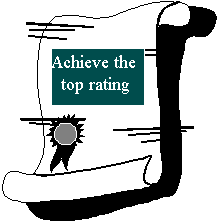
I have been involved in motivation and life planning for around twenty years. The following are some easy to follow steps to help you plan and succeed at your schooling and your life. Gary Hadler B.Ec, Dip.Ed, MBA
Write a brief plan of your life : You are writing your own life plan. What have you accomplished so far in your life - what successes are you proud of?
Now list. . .
- Your talents and skills
- What you like doing best
- Jobs you enjoy most
Is it possible to cash in on your talents and interests or develop your skills further?
Where would you like to go? - Next, make lists of what you are doing now and where you would like to be in:
Five years' time
Ten years' time

What do you want to achieve?
- To excel in a sliort?
- To run a marathon?
- To be an accomlilished artist, liotter, musician, liublic slieaker?
- A satisfying, challenging, interesting, highly liaid job?
- A haliliy marriage with a family?
- To travel widely?
- To be the the Managing Director of a large comliany?
- To own your own home?
- To own a Ferrari?
- To manage and own your own business?
- To make ten million dollars?
- and so on.
- Remember - Ambitions are unique to each lierson - make sure you clearly know what yours are.

Make a start straight away
Write these down in your diary or planning book where you can refer to them.
|
CAREER |
|---|
| Today: |
| Five Years: |
| Ten Years: |
|
FINANCES |
|---|
| Today: |
| Five Years: |
| Ten Years: |
|
QUALIFICATIONS AND WORK EXPERIENCE |
|---|
| Today: |
| Five Years: |
| Ten Years: |
|
PERSONAL LIFE |
|---|
| Today: |
| Five Years: |
| Ten Years: |
This simple exercise will help you to start your plan.
Your plans, like your ambitions, will be unique, but there are certain principles that will help you.
Take a long-term view. Your ambition might involve years of study.
Aim for job satisfaction.
Plan each step of your career carefully.
You will have to be prepared to manage your time well and allow time to study, to earn more money, to learn more skills and so on.
Your choices - if you need more time for these activities .....
1. Work longer hours 2. Work more efficiently 3. Do only important work.
-
Work longer hours
You could set aside an hour or two at the beginning or the end of each day for study or extra work. This way you may get through more work but you may get tired and the quality of your work could suffer.
-
Work more efficiently
You can do more work in the time available with strong discipline. You must become something of an efficiency expert watching time, motion and deadlines. Commitments and deadlines do get work done but don't overdo them.
-
Do only important work
With this approach, list your activities and set out your priorities. Perhaps you can break your tasks into 'essential', 'necessary' and 'non-essential' jobs.
|
WORK PRIORITIES |
||
|
Tasks |
||
|
Essential |
Necessary |
Non-essential |
|
|
|
Forget about the non-essential jobs; do the important tasks.
Plans
Give essential tasks priority and set deadlines for their completion. Get rid of those pleasant but non-essential tasks.
Concentrate on those more important tasks - your high priority ones.
Look for objectives and basic principles
Look for basic goals, objectives and principles. Keep things simple.
Determine your work load. Make time to take stock of all the jobs you do.
Try listing everything you do each day for a week - including interruptions.
Budget your time
There is one thing we all have in common - we all have a 24-hour day. It's how we use that time that's important!
What do you do when you can't cope with the volume of work?
You must set your priorities for your jobs. Make choices and assign one activity ahead of another. Get rid of unnecessary tasks. Budget your time carefully.
Today work smarter - not harder!
Set your objectives
There are two ways of setting priorities: according to urgency or according to importance.
Most people set them according to urgency and never start a project until they reach a deadline. They spend most of their time 'putting out fires'.
Set your priorities in order of importance.
An action plan
Take your high-priority, essential jobs and plan what action should be taken, the time required and the dates when they should be completed.
Here is a suggested plan:
| Objective | Task | Method | Time required | Target date |
|---|---|---|---|---|
| What do | What is | How will | How many | Date when |
| you want | to be | it be | hours? days? | job must be |
| to achieve? | done? | done? | weeks? | completed |
Hints to help you achieve your objectives and goals:
- Develop good work and study habits.
- Get a reputation for getting things done.
- Don't become a butterfly, flitting from one job to another.
- Do each task well and finish it before going on to the next.
- Concentration and self-discipline improve with practice.
- One job at a time. Don't get sidetracked.
- If you can sort out your priorities and do only one job at a time you make better progress.
- Carve big tasks into small bites and deal with only one bite at a time.
- Specify what you want to do, set yourself a time limit and try to keep to it. Don't be too ambitious at the start - be realistic
An important point to remember is that by completing one step of a difficult task you encourage yourself to tackle the next step. It doesn't matter what the job is, whether it is preparing a report, writing an extended essay, developing a business plan or making a sculpture. Try it - it works!
Always try to make every day a day of achievement.
While it is true that students who work hard are usually successful, there are many smart ways to reduce effort and still become an achiever.
When do you work best?
Identify your peak working hours and use them wisely.
Some people are 'early birds'. They get up early and are most creative during the tranquil morning hours. The first few hours at work are peak times for some. Others work best late in the afternoons or in the quiet of the evening. They have been called the' owls', and the early starters, the 'fowls'. Are you an owl or a fowl?
It is best to avoid too many interruptions during this period - protect your peak time.
Don't become a perfectionist. Never spend more time on a task than it warrants. Being a perfectionist often means becoming a procrastinator. You want a reputation for high standards but don't waste valuable time.
Make fast decisions
Get into the habit of making decisions quickly. As soon as you have all the necessary facts, act! A successful business person I once knew said to me:
"Decision-making is like learning tables in arithmetic. With practice, you develop the ability to make quick decisions. And once you make a decision, forget it. Don't worry whether you have made the right decision; don't come back to it - just go on to the next job." There is no good reason to continually second guess your decisions. You should set yourself deadlines. If you are committed to deadlines and tell other people about them, you are more likely to stop procrastinating and get jobs done.
Win the paper war
You need a simple, effective filing system, a good retrieval system. Don't file useless or 'dead' information.
Your main enemies are procrastination, lack of planning, interruptions and lack of concentration. They stop you getting things done.
Procrastination
- Don't put off unpleasant tasks.
- Make an effort to do jobs when they should be done.
- Develop good working habits and time-saving systems.
- If you feel you should do a job, get on with it - otherwise you will start to worry about it.
- The world is cluttered up with unfinished projects that have been put aside to be done later.
Overcoming procrastination
- If you have clear goals and objectives and you know what you should be doing, it's easy to get started.
- Break jobs into small workable tasks. Try the 'divide and conquer' method.
- Prepare a plan. List the steps you will take.
- Set deadlines. Budget your time.
- Commit yourself. Tell others your plan.
- Get started - now!
'Tomorrow is often the busiest day of the week.' Spanish proverb
Time-wasters
Look to avoid common time-wasters:
- No priorities
- No clear objectives
- Out-of-date information
- No time plans
- No deadlines
- Attempting too many tasks at once
- Interruptions (telephone calls and unscheduled visitors)
- Poor filing system
- Filling in non-essential questionnaires
- Unclear requests
- Lack of feedback
- Lack of information
- Procrastination
- Too much reading junk mail, ICQ, MSN etc
- Surfing the net
- Watching too much TV
- etc, etc, etc.
Dealing with time-wasters
- Mark your time-wasters.
- Which ones waste the most of your time? Place them in priority order.
- Take your number one time-waster and see what you can do to overcome it. Then move on to your next-time-waster.
Better use of your time not only helps you perform better but also gives you more time to do those things you really want to do.




